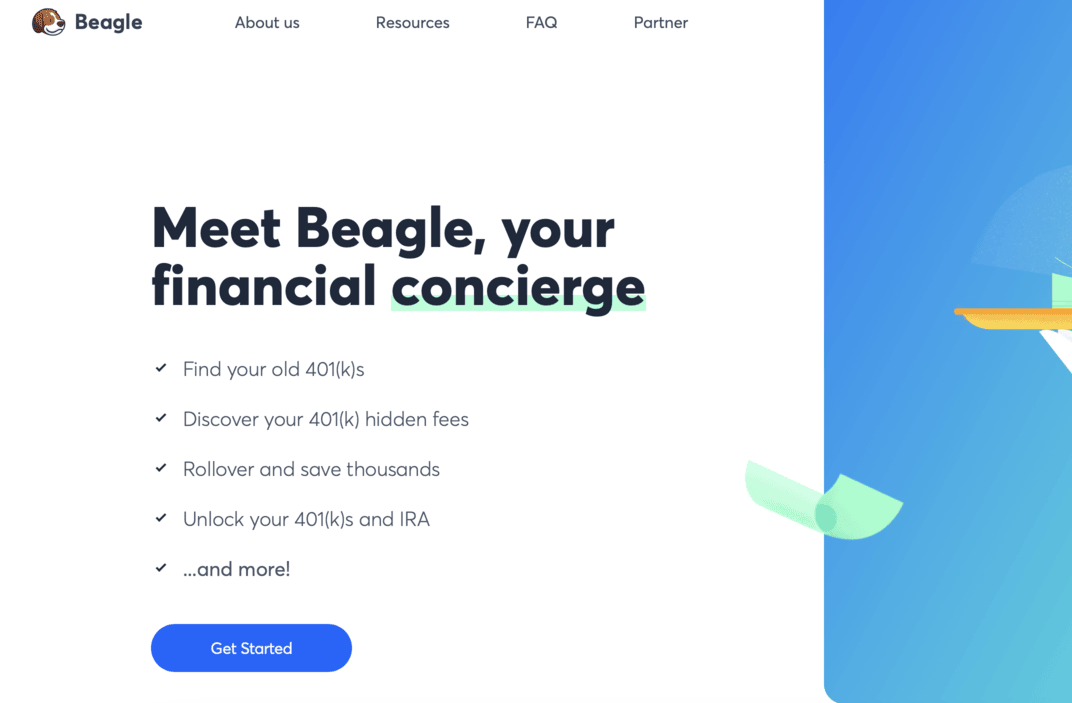Is ASPCA a Scam?
Laura Martisiute
Reading time: 6 minutes
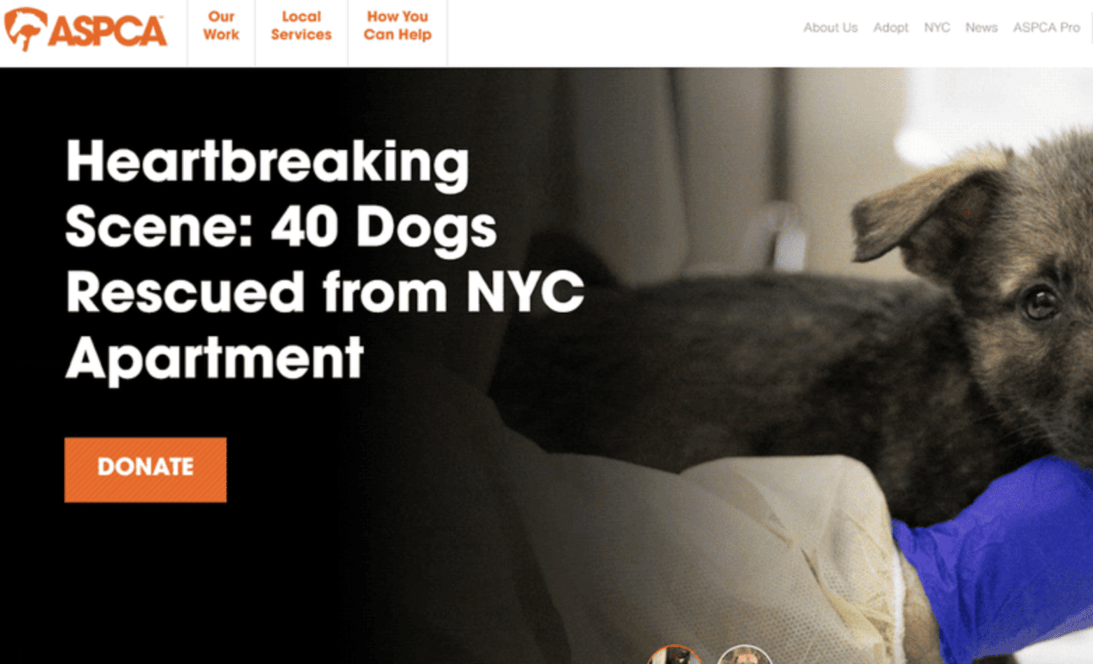
Table of Contents
If you’re thinking of donating to the ASPCA, you need to know if ASPCA is safe. Is ASPCA a scam?
Below, we explain whether ASPCA is a scam and discuss some steps you can take to improve your safety when donating to this non-profit organization.
What Is ASPCA?
The ASPCA is a non-profit organization dedicated to preventing animal cruelty and promoting animal welfare.
The acronym “ASPCA” stands for the American Society for the Prevention of Cruelty to Animals.
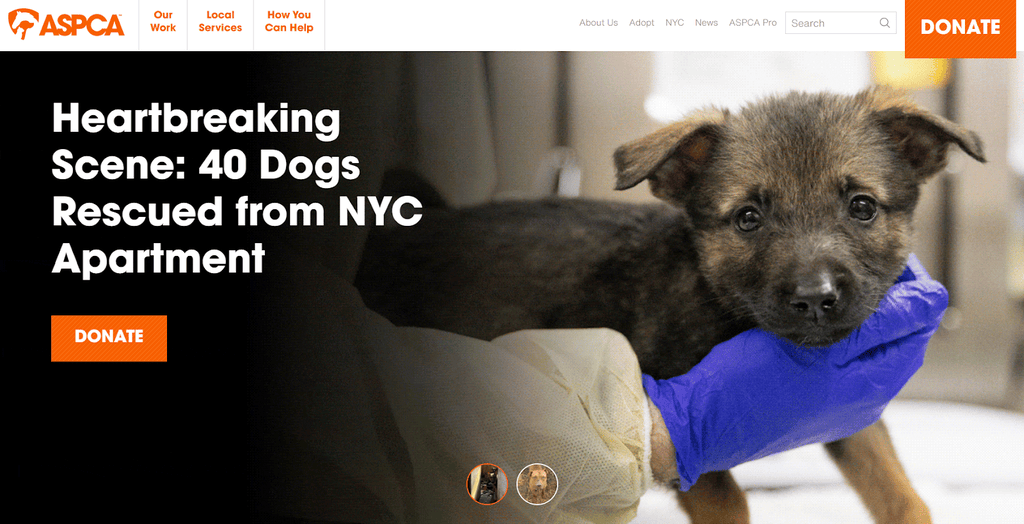
The ASPCA is one of the best‑known animal welfare organizations in the United States. It’s also one of the oldest, having been established in 1866 by the animal welfare activist and diplomat Henry Bergh in New York City.
Is ASPCA a Scam?
No, the ASPCA is not a scam. It’s a legitimate nonprofit organization dedicated to improving animal welfare.
However, the ASPCA has been subject to some controversies.
Specifically, in 2021, CBS News reported that an ASPCA fundraising ad featuring the Canadian singer-songwriter Sarah McLachlan, which raised millions for the organization, was misleading donors into thinking their donations supported local SPCAs and animal welfare charities.
In response, an ASPCA spokesperson stated that donors were aware the ASPCA was not an umbrella organization for local organizations with ‘SPCA’ in their names.
CBS News also reported that in 2019, the ASPCA’s CEO’s compensation was over $840,000, higher than that of leaders of larger charities.
Mentioned also was the ASPCA’s practice of selling donor lists (bringing in $3.2 million between 2009 and 2019).
After the CBS News piece was published, two Facebook posts began going viral, claiming that only three cents of every dollar donated to the ASPCA is used for veterinary supplies and animal transportation, and that the ASPCA’s CEO receives an annual salary of $600,000, with a $100,000 bonus.
The claims in these Facebook posts were debunked by USA Today News.
According to it, the ASPCA’s tax filings show that the organization spent 34.4% of its budget on shelter and veterinary care in 2019. And about three-quarters of its expenses recently went to efforts that support its mission statement.
Additionally, only a small fraction of ASPCA’s budget went towards compensation for executives.
Charity Navigator, a non-profit organization that evaluates and rates charities in the US, gives the ASPCA a 99% rating.
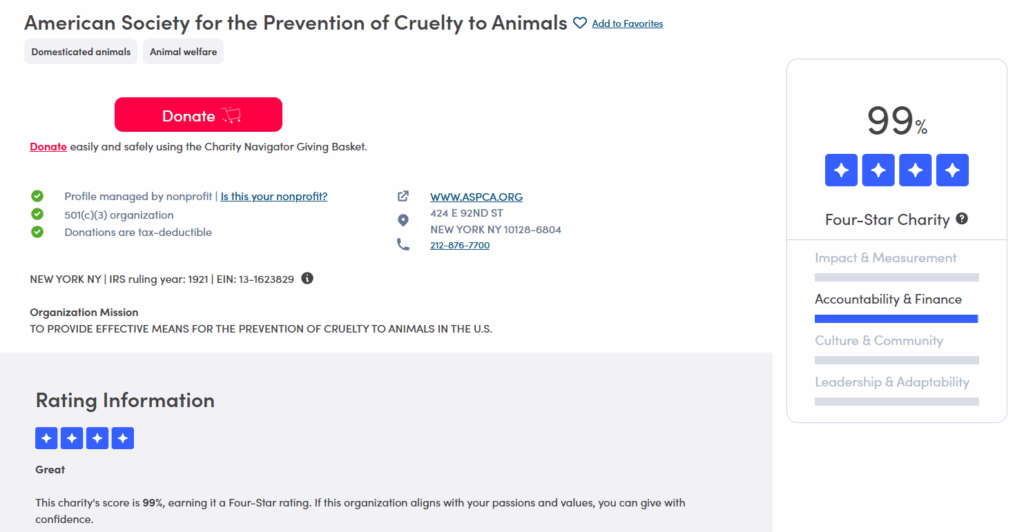
According to Charity Navigator, the ASPCA is a “Four-Star Charity” (i.e., if the ASPCA “aligns with your passions and values, you can give with confidence.”)
Security
In its privacy policy, the ASPCA says it uses “a combination of physical, technical, and administrative safeguards” to keep your personal information safe.
It does not provide details about what these safeguards are.
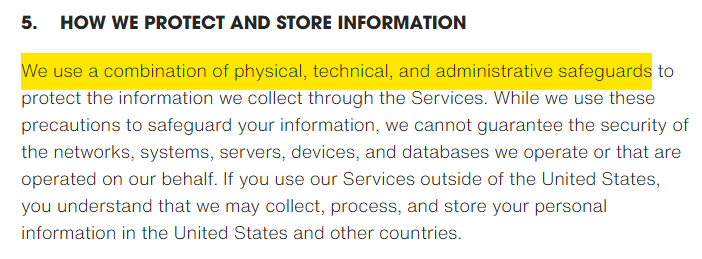
Privacy
The ASPCA explains the type of data it collects, why it collects it, and with whom it shares it in its privacy policy.
It collects the following information directly from you:
- Account information, such as your name, password, email address, and usage preferences.
- Contact information, including your phone number, postal address, and email address.
- Information collected when you foster, volunteer, or adopt, such as your date of birth, gender, employment history, educational history, and allergies.
- Transaction information, including payment information and history (if you donate).
- Your photo for a security badge if you visit one of the ASPCA locations.
- Any additional information you provide, including questions and feedback.
The ASPCA also collects some data automatically (usage data and, if you allow it, location) and from third parties (such as marketing/ad interaction data and contact details shared by mission-aligned organizations).
The ASPCA also uses cookies, Google Analytics, Google Ads, Meta Pixel, and other trackers to understand site usage, serve customized ads, and prevent fraud.
It uses your data to deliver and improve its services (e.g., account management, donations, adoption processes, and tech support), communicate with you (via newsletters, support, and marketing), run and measure campaigns, personalize content, and conduct research.
It also uses your information to meet legal obligations and protect against fraud or abuse.
The ASPCA may share your data with service providers (e.g., payment processors, IT, marketing, etc.), adoption partners and co‑sponsors for events or programs, advertising networks for interest‑based ads, and other non-profits (with your opt‑out right) that may offer relevant services.
Additionally, it may disclose your information in legal & transactional contexts (e.g., subpoenas, mergers, and bankruptcy proceedings).
Donors can submit a request to the ASPCA to see the information the organization has on them and request any corrections.
They can also request to opt out of having their contact details shared with third parties for marketing purposes.
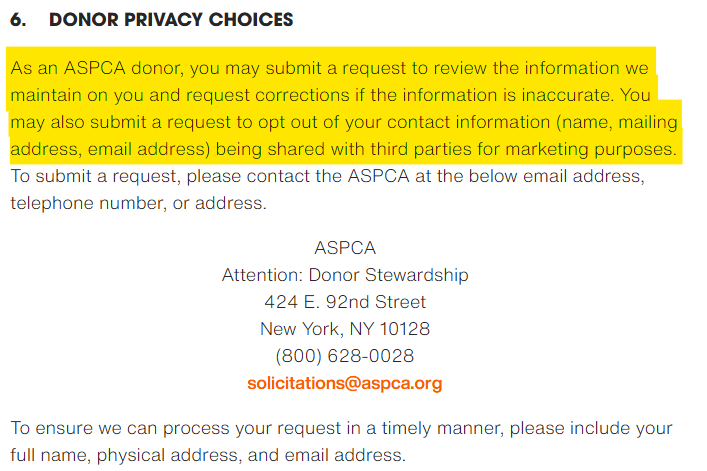
Charity Navigator deducts one point from the ASPCA for defaulting to sharing donors’ contact information unless the donor takes action to opt out.

So, Should You Donate to the ASPCA?
Probably.
The ASPCA is a well-established charity with a long history of animal advocacy and rescue work.
From a privacy perspective, the ASPCA collects a standard mix of personal, transactional, and usage data and defaults to sharing donor contact details with partners unless the donor opts out. Donors can request that their information not be shared.
How to Donate to the ASPCA Safely and Privately
- Use the official HTTPS ASPCA website. Always donate through https://www.aspca.org to ensure your connection is encrypted. If you make frequent donations, bookmark the site to ensure you’re not deceived by phishing URLs.
- Use a dedicated email address or create a masked email. Create a dedicated email address for donating or use a masked one to prevent your primary email inbox from being cluttered with marketing and spam.
- Minimize personal details. Only fill out the required fields (name, email, payment info) and skip all optional fields.
- Opt out of data sharing. After donating to the ASPCA, email solicitations@aspca.org with “Please opt me out of donor‑list sharing” to ensure they don’t share your contact details with third parties for marketing purposes.
- Manage cookies and trackers. Click the “Cookie Preferences” link on the ASPCA website footer and turn off non‑essential cookies.
Our privacy advisors:
- Continuously find and remove your sensitive data online
- Stop companies from selling your data – all year long
- Have removed 35M+ records
of personal data from the web
Save 10% on any individual and
family privacy plan
with code: BLOG10
news?
Don’t have the time?
DeleteMe is our premium privacy service that removes you from more than 750 data brokers like Whitepages, Spokeo, BeenVerified, plus many more.
Save 10% on DeleteMe when you use the code BLOG10.

